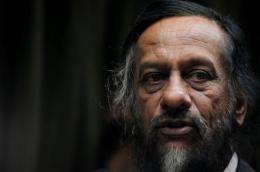Glacier alarm 'regrettable error': UN climate head

The head of the UN's climate science panel said Saturday a doomsday prediction about the fate of Himalayan glaciers was "a regrettable error" but that he would not resign over the blunder.
Addressing a press conference in New Delhi, Rajendra Pachauri, chairman of the Nobel-winning Intergovernmental Panel on Climate Change (IPCC), said the mistake arose from "established procedures not being diligently followed."
"I am not resigning from my post. There has been an error but we will ensure greater consistency in every (future) report," he said.
"I am not brushing anything under the carpet," he added.
Pachauri was referring to a forecast which featured in a benchmark 2007 report on global warming that the probability of glaciers in the Himalayas "disappearing by the year 2035 and perhaps sooner is very high."
The IPCC's Fourth Assessment Report was a 938-page opus whose warning that climate change was on the march spurred politicians around the world to vow action.
Earlier in week, the panel apologised for "the poor application of well-established IPCC procedures."
In the latest statement on what the media have dubbed "Climategate," Pachauri said the report's general conclusions that Himalayan glaciers were retreating due to global warming were "robust, appropriate, and entirely consistent with the underlying science."
"The world is on the path of unsustainable development and we will have to change our lifestyle," he told reporters.
He said the forecast that the glaciers could disappear by 2035 may have "genuinely alarmed" some people.
But he said there had been a benefit in that it created a "heightened awareness about the real threat to Himalayan glaciers."
The IPCC co-won the 2007 Nobel Peace Prize for bringing climate change to the world's attention.
The glacier error came to light after four prominent glaciologists and hydrologists wrote a letter to the prestigious US journal Science. They said the paragraph's mistakes stemmed from a report by the conservation group WWF.
WWF had picked up a news report based on an unpublished study, compounded by the accidental inversion of a date -- 2035 instead of 2350 -- in a Russian paper published in 1996.
"These errors could have been avoided had the norms of scientific publication, including peer review and concentration upon peer-reviewed work, been respected," according to the letter to Science.
Pachauri defended the panel's overall work, a position shared by other scientists, who say the core conclusions about climate change are incontrovertible.
He added he would finish the IPCC's Fifth Assessment Reports.
The reports, due out in 2013 and 2014, will focus on sea level changes, the influence of periodic climate patterns such as the monsoon season and El Nino, and forge a more precise picture of the regional effects of climate change.
"Rational people continue to repose faith in IPCC and are seeing the larger picture," Pachauri said.
India's Environment Minister Jairam Ramesh said following revelation of the gaffe he felt "vindicated" after repeatedly challenging the IPCC's work on glaciers.
Ramesh has said he believes there is no "conclusive scientific evidence" linking global warming to the melting of glaciers.
(c) 2010 AFP
















